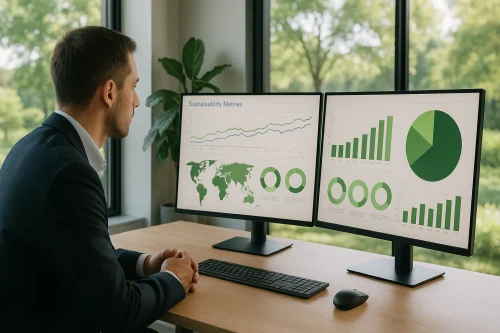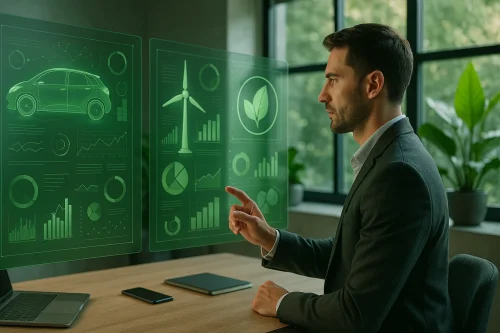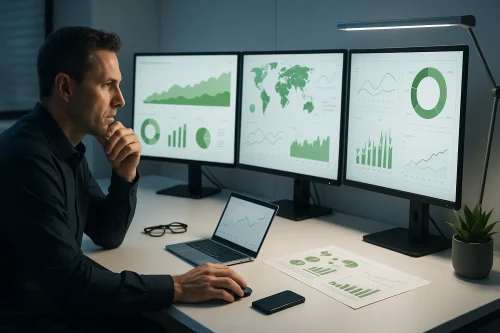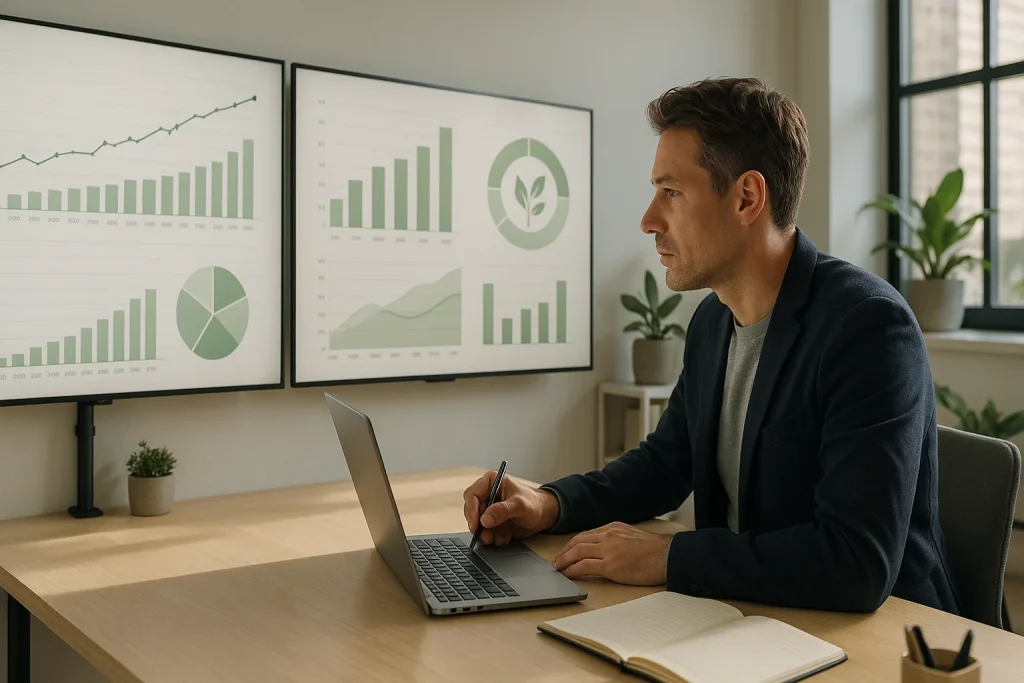Table of Contents
The business landscape has evolved dramatically over the past decade, and sustainability has shifted from a desirable feature to a non-negotiable foundation for long-term success. Founders launching new ventures in 2025 face rising expectations from consumers, investors, regulators, and employees.
The modern business model must not only generate profit, it must also prioritise stability, resilience, and responsibility.
Sustainable business models go far beyond eco-friendly operations. They are built on strong financial structures, ethical decision-making, customer trust, and adaptable strategies.
In a world shaped by economic uncertainty, rapid digitalisation, and global competition, the companies shaping the future are those that think beyond short-term wins.
This article explores how founders across the UK can design business models built not only to survive early-stage challenges but to thrive in the long run.
How Can Founders Build Sustainable Business Models?
Building a sustainable business model begins with one clear idea: longevity is intentional. It requires founders to look beyond immediate revenue goals and consider operational resilience, stakeholder impact, and long-term strategic planning.
Sustainability isn’t a single initiative, it’s a combination of aligned decisions. It includes the ability to manage resources wisely, support workforce development, maintain financial efficiency, and deliver consistent value to customers.
Founders who build with sustainability in mind create stronger foundations, reduce vulnerability to market shocks, and develop a business that can scale efficiently without compromising ethics or quality.
What Does Sustainability Really Mean for Modern Businesses?

Sustainability for modern businesses is multi-layered. It is not limited to “green” practices or environmental responsibility, it encompasses financial, operational, ethical, and social pillars.
The Four Components of Business Sustainability
A well-rounded sustainable business model typically includes:
- Environmental sustainability: Minimising waste, improving energy efficiency, or choosing sustainable materials.
- Financial sustainability: Ensuring the business maintains positive cash flow and long-term profitability.
- Operational sustainability: Streamlining processes, building efficient systems, and reducing dependency on fragile structures.
- Social sustainability: Treating workers fairly, supporting communities, and prioritising customer well-being.
These interconnected components ensure the business thrives in changing conditions and remains competitive as industries evolve.
How Can Founders Align Purpose With Profitability?
Mission-driven businesses are no longer outliers, they are becoming the new norm. Customers increasingly prefer brands that stand for something meaningful, and investors are placing value on companies with strong ethical direction.
True sustainability emerges when purpose and profit reinforce each other. Purpose gives a company its identity, guides decision-making, and influences how customers perceive it. When the mission is clear, the business can lead with confidence, develop loyal communities, and differentiate itself in crowded markets.
Purpose as a Strategic Asset
Purpose-driven companies often benefit from:
- stronger brand loyalty
- better employee engagement
- improved investor trust
- long-term differentiation
Aligning purpose with profitability doesn’t mean sacrificing revenue, it means building a model where ethical decision-making strengthens commercial success.
What Role Does Innovation Play in Creating Sustainable Models?

Innovation is one of the strongest supporters of sustainability. Founders who embrace innovation early build companies that adapt to evolving market conditions rather than fighting against them.
Innovation as a Stability Engine
Innovation helps businesses become more efficient, customer-focused, and operationally resilient. It enables founders to explore new markets, improve products, and develop streamlined internal systems.
Key Innovation Strategies
- Digitising processes to reduce manual errors and operational costs
- Exploring new business models such as subscriptions or hybrid offerings
- Using emerging technology like AI for forecasting and automation
Through innovation, founders create systems capable of evolving with customer expectations and economic shifts.
How Important Are Ethical Supply Chains in Long-Term Sustainability?
Supply chains form the backbone of every business. An unreliable or unethical supply chain can undermine trust, increase costs, and damage brand reputation. As global disruptions continue, founders must design supply chains that not only operate efficiently but also align with responsible business practices.
Why Ethical Sourcing Matters?
Consumers increasingly expect businesses to be transparent about where their materials come from and how their products are made. Ethical supply chains protect worker welfare, support responsible production, and help founders meet modern compliance standards.
Beyond ethics, a reliable supply chain supports operational resilience and reduces the risks of delays or sudden shortages.
Strengthening Supplier Partnerships
Effective founders build relationships with suppliers that are anchored in fairness, transparency, and mutual trust. These partnerships ensure consistent delivery and help companies respond quickly to disruptions.
How Can Founders Build Financial Resilience for the Long Term?

Financial resilience is one of the most important aspects of sustainable business design. Without a solid financial foundation, even the most innovative idea or responsible business model can fail.
Foundations of Financial Sustainability
The financial health of a business depends on careful planning, disciplined budgeting, and diversified income streams. Founders must anticipate unexpected challenges, from market shifts to operational disruptions, and build structures that protect their resources.
Strategies for Strong Financial Resilience
- Maintaining healthy cash reserves for operational stability
- Diversifying revenue streams to reduce dependency on a single income source
- Implementing smart budgeting tools for real-time financial oversight
According to London Business Insider, founders who prioritise financial resilience from day one position their businesses for sustainable, scalable growth.
What Role Does Customer Trust Play in Sustainable Growth?
Customer trust is one of the most valuable assets a company can own. In an era where consumers scrutinise businesses more than ever, trust becomes central to long-term sustainability.
Trust as a Competitive Advantage
Consumers remain loyal to brands that are consistent, ethical, and transparent. Trust drives repeat purchases, word-of-mouth recommendations, and brand advocacy, factors that help businesses grow organically.
Why Trust Matters for Sustainability?
- It strengthens customer lifetime value.
- It reduces reliance on high-cost marketing.
- It creates a stable foundation for growth in unpredictable markets.
Founders must approach customer relationships with integrity and consistency to build sustainable momentum.
How Can Founders Use Data and Technology to Strengthen Sustainability?

Data and technology play a crucial role in building sustainable business models by improving efficiency, reducing waste, and enhancing decision-making.
Data as a Strategic Tool
Founders who use data effectively can better understand customer behaviour, operational gaps, and future risks. Data-driven businesses make more accurate, confident decisions.
Ways Technology Supports Sustainability
- Automation optimises processes and reduces manual inefficiencies.
- Data analytics improves forecasting and market accuracy.
- Cloud platforms support scalable, low-cost operations.
Through technology, founders develop business models that are both adaptive and resource-efficient.
Why Is Talent Development Essential for a Scalable Business Model?
People are at the core of every business. A sustainable business model requires a skilled, motivated, and future-ready workforce.
Nurturing Talent for Long-Term Success
Founders who invest in training, upskilling, and leadership development create teams capable of supporting innovation and growth. A strong internal culture not only attracts great talent but also retains it.
How Talent Shapes Sustainability?
A skilled workforce improves productivity, strengthens customer relationships, and reduces turnover-related costs. When employees feel supported, they contribute to long-term organisational success.
Conclusion
Sustainable business models are not built overnight. They require intentional choices, a long-term vision, and the ability to balance profitability with responsibility. Founders must design systems that withstand changing markets, evolving customer expectations, and technological transformation.
Sustainability becomes a competitive advantage when founders align purpose with profit, innovate thoughtfully, invest in people, and maintain financial discipline.
The future of entrepreneurship in the UK will be shaped by leaders who embrace resilience, adaptability, and ethical decision-making, building businesses that thrive across generations.
FAQs
What is the first step founders should take to build a sustainable business model?
Start by defining a long-term vision that aligns with your values and outlines how the business will deliver consistent value.
How does innovation support sustainability?
Innovation improves efficiency, lowers costs, and allows businesses to adapt to market changes without compromising quality.
Why is customer trust essential for long-term success?
Trust fuels loyalty, repeat purchases, and brand advocacy, all of which strengthen long-term business stability.
How can founders improve financial resilience?
By diversifying revenue, maintaining healthy cash reserves, and using budgeting tools that offer real-time financial insight.
What role does technology play in sustainability?
Technology enhances efficiency, supports smarter decision-making, and helps build scalable, resource-efficient operations.

